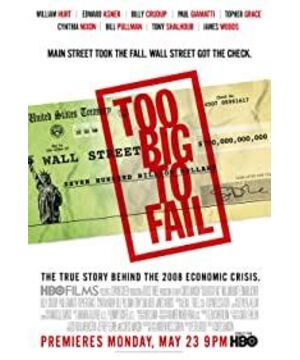There is always a contradictory logic in this movie, that is, before the financial crisis, the big investment banks made a lot of money by issuing subprime loans without restraint, but when the financial crisis came, due to the large scale of investment banks, And it has become so deeply ingrained in the financial system that the government has to cover the greed of investment banks, or guarantee a large number of toxic assets, or help to connect transactions, or finally direct capital injections without shareholder voting rights. In Parson's words, the government was "the man behind the elephants' dung." But further down the line, lower-middle-class American citizens are the ultimate victims. When the financial crisis broke out, low-income earners who received subprime loans not only had to lose their shelter due to falling house prices and were unable to repay their loans, but also the funds used by the government in the process of making the bottom line were still their taxpayers' money. In general, After the financial crisis, income disparities remained the same or widened.
However, the U.S. government has no choice. It can either allow the investment banks to go bankrupt and the financial system to collapse, which will lead to the depression and depression of the entire national economy, that is, make everyone poor, or turn the tide and maintain the investment banks, temporarily closing the huge gap in the economy. Blocking, that is, retaining the greedy rich people in the past. Obviously, the latter is better than the former, because the former is like a big shuffle, and everything has to be restarted, while the latter retains that part of the fire, although this fire has ignited the fire, but future survival and development still needs Rely on this tinder.
So no matter how morally, the government's move goes against people's psychology, the government must do it, because investment banks have already too big to fall.
If we look at the financial crisis more macroscopically, we will find that it is not only an economic problem, but also exposes the problems existing in the American political system. Where was the government when it issued subprime loans recklessly before investment banks? Where is the regulation? Because anyone with a little bit of economic common sense can easily find the fragility of subprime loans, because it fundamentally violates the principle of credit. Subprime mortgages convert lenders' credit into real estate credit in disguise, ie they issue on the premise that the real estate promises to keep rising in price. However, according to the population growth rate, demand elasticity and housing supply situation in the United States, housing prices cannot keep rising, so credit collapses and subprime mortgages will become a bottomless pit. Surprisingly, the government with many elites, at this stage, coldly watched the investment banks play with the whole credit economy without taking any measures to stop or regulate it. Even America's most complacent democratic Congress has made no voice of questioning opposition. The only explanation for this anomaly is the control of interest groups. As a result, everything is logical, interest groups control, interest groups profit, and the American people, pay the bill.
Although the economic base determines the superstructure, it must be affirmed at all times that the superstructure is placed on the economic base. Once the superstructure is controlled by the economy, the entire national interest, the entire social interest, and the entire public interest are all victims of the economy.
View more about Too Big to Fail reviews











